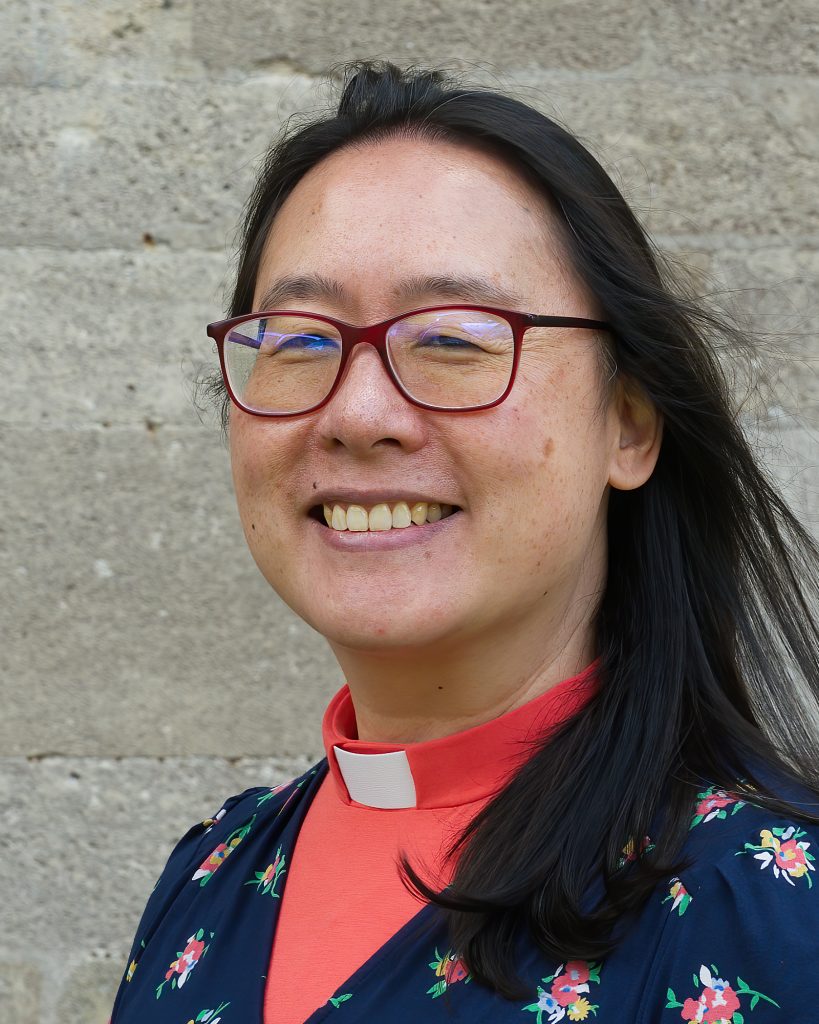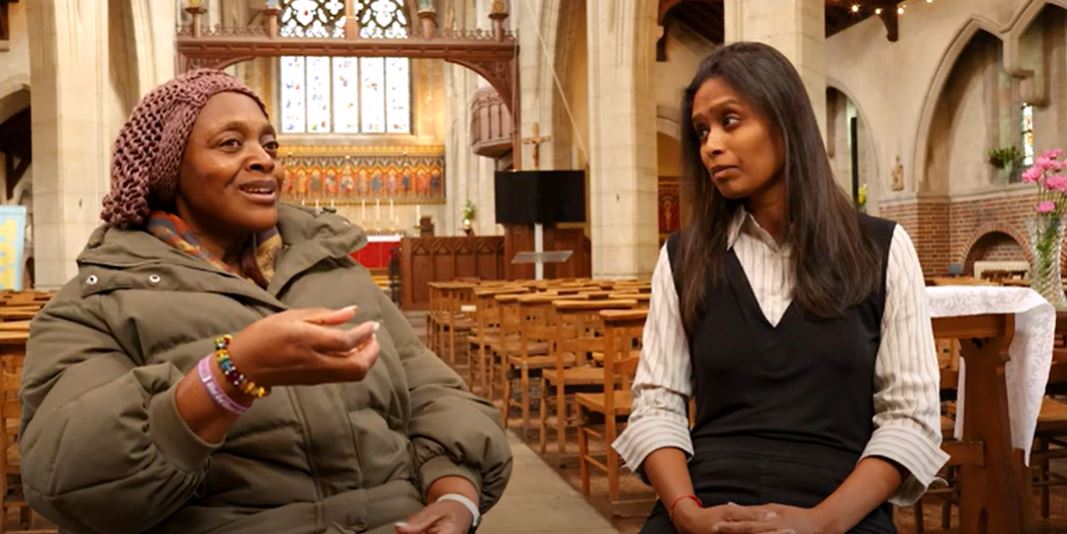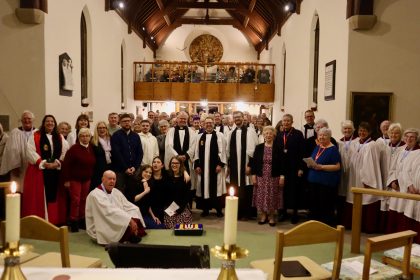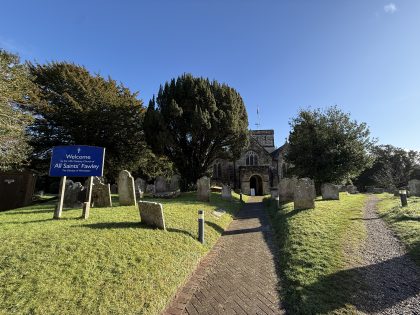We are delighted to announce that last week, Diocesan Synod approved a new Racial Justice Strategy overwhelmingly, after hearing reflections from Revd Yin-Yin Bull, Assistant Curate at Romsey Abbey, and an ordinand in our diocese. A short video was also shown featuring members from St Michael’s Basingstoke, exploring their experiences of racial justice….
Lucy Howlett, Project Coordinator for Racial Social Justice, put the new Racial Justice Strategy together, with the support of the Racial Justice Advisory Group, has explored the topic of racial justice in more detail below:
Racial justice is the equal treatment of everyone regardless of ethnicity or race. To achieve racial justice, societies must tackle racial prejudice, discrimination, and systems that disproportionately harm some while favouring others. Racial justice reckons with the legacies of discrimination, removes existing barriers to racial equality, and promotes equity. By reviewing and producing the strategy we aim to embed a process of eliminating racial disparities and improving outcomes for everyone. It is the intentional and continual practice of changing policies, practices, systems, and structures by prioritising measurable change in the lives of UKME/GMH people within our communities. Our aims include better data monitoring, ensuring balance for panels for interviews to reflect the interviewee and having a three-stage learning programme teaching unconscious bias, intercultural awareness and anti-racism.
This is not about marginalising people to empower minorities within our churches – it is about bringing balance and being honest that we have diverse communities that are simply not being represented in our spaces. This is not about amalgamating multi culturalism, it is about becoming intercultural and journeying together as one in Christ – everyone, including those that identify as white, need to feel part of this story and part of the church. It is about intentionality, and not tokenism, and everyone having a role based on their merit and gifts, casting our nets out further to embrace everyone.
Lucy Howlett, Project Coordinator for Racial Social Justice
You can find a copy of the new diocesan Racial Justice Strategy here >>>
Revd Yin-Yin Bull and Chihera have shared their inspiring testimonies below, which reflect on their personal experiences as well as the wider issues surrounding racial justice.
Revd Yin-Yin Bull, Assistant Curate at Romsey Abbey

Good evening Synod, my Brothers and Sisters present here today. It’s so good to be given this opportunity to share some personal thoughts and reflections.
George Bernard Shaw once wrote, ‘Beware of false knowledge, it is worse than ignorance.’
How much of what we consider to be truth, is actually influenced by our own set of assumptions, biases, conscious or unconscious? How self aware are we? How self aware do we want to be?
George Bernard Shaw’s warning should cause us to pause and be more aware of assumptions and biases based our own invariably flawed perspectives.
I can only speak about racial justice from my own perspective. Please remember we are all uniquely created in God’s image, so please do not place a label on me. It’s even been suggested to me that my vocation and presence could even be a tick box exercise for the church. I have noticed sometimes the different ethnicities are brandished together as one. I can not possibly be the voice for all racial diversity; diversity is so much bigger than any of us here today. I can not even be the voice of all Chinese people. I am not Malaysian, where my mother is from, nor am I from Hong Kong, where my father is from. I am British with their Chinese heritage, but I have never been to China.
Growing up in Liverpool in the 1970’s being Chinese, and having contact with other Chinese people, usually meant they were a restauranteur, and in the first 8 years of my life, I rarely attended school for the fear of physical violence and prejudice that my father had received growing up in Toxteth. So for safety I lived in a closeted community where you could get by with almost no English.
You’d think things would have improved since the time I was born, but it’s been an up and down journey of forgiveness, understanding and bridge building.
I was beginning to feel quite a sense of belonging in my country of birth. That was until Covid struck. I was working in a school, and some children refused to work with me, because I might have Covid. Our son was told by one of his school friends’ parents to keep away. Meanwhile, in Southampton, a doctor going on a jog was beaten up because he looked Chinese.
Headlines, from politicians, like ‘Covid is a Chinese virus’, have had a powerful effect on public perception. Stereotypes are a powerful tool. Our busy lives and lack of time to look into every aspect of information thrown at us, in our fast paced digital age, means that we may rely on these headlines. The philosopher Bhabha identifies that for stereotypes to form and retain their power, it only requires ambivalence. Ambivalence, ignorance, and false knowledge are close relations. So we all need to work a little harder, particularly as Christians seeking transformation in Christ, to dispel stereotypes, to seek meaningful encounters and relationship.
The church has been a place of sanctuary, the place where I go to feel I belong. Theologically and scripturally yes this is true, however this is not always the practical reality. I was engaged in conversation recently at a wider church meeting, about issues of integration and the question of ‘what we call ourselves’ was raised. I was asked ‘how can people say they are British and something else….?’ Their opinion was ‘I don’t believe in Diversity.’ Surely, where we have come from informs all our Christian identity; after all, our Anglican communion is world wide and is diverse, many languages and many peoples. Perhaps it can be hard for some to imagine how all of us, ALL OF US, are created in God’s image.
Perhaps who I am is of less importance; when I set myself aside to serve others, who I am matters less. We are all called to embrace the context in which we find ourselves in; we can all look to St Paul, in his first letter to the Corinthians for inspiration on embracing the other. Paul says in 9:22, ’I have become all things to all people so that by all possible means I might save some.’
Our call as Christians is to think of ourselves less, so we can be more embracing of the other, but who is other? It is the person sitting next to me and you right now, also created in God’s image, who will have their own lens and set of assumptions and interpretations, and their own pain and baggage, but also concurrently trying their best to love and to forgive, seeking redemption in Christ, seeking transformation in Christ. But also remember that to us, God is also Other, therefore to deny a place for Other is perhaps also to deny who God is.
I believe, we still have a long way to go on issues of Racial Justice – the challenges facing the church are still there today, divisions, mis-information, mis-directed anger; we are all in the same boat, messily muddling along. I was on a chaplaincy taster week recently, where an expert in Ethics informed us there is no word for peace in Chinese.
I was compelled to correct this information and question its source!
But somehow these headlines stick. Polarisation, fear and anxiety, are somehow contagious. We need to fight this disease of mis-information and forming judgement and opinion based on bias and headline news, which can cause racial injustice, hatred, suspicion, and incite violence.
So – my Brothers and Sisters in Christ, it starts with us, here today. It starts with our internal posture, a posture of love and open heart and acceptance and being willing to listen to the other perspective. The other perspective invites us to confront our own fears and anxieties about our own sense of belonging and identity. The other perspective is an invitation to open our hearts to know more about the meaning of God’s love and therefore be part of God’s healing in people’s lives. In her book, Tarry Awhile, Selina Stone reminds us that the stories we tell, which are about liberation, and which are healing, should reinforce the idea that those with power must be trusted with the task of freeing those they have disempowered.
So Brothers and Sisters thank you for listening to my story today, for empowering me to have a voice; let us together empower others who have been hidden in the shadows also, to find their voice and their story within Christ’s story. Amen.
Chihera, Ordinand in the Diocese of Winchester
Good evening Synod, I stand here today not only as an ordinand, but also as a Black woman who has walked a journey of faith within this Diocese of Winchester. My journey has been marked by both a deep love for the Church, and a sorrowful recognition of its shortcomings when it comes to racial justice.
As I’ve walked through the discernment process, I’ve often been struck by the overwhelming absence of racial diversity among those stepping forward for leadership. Time and again, I’ve entered spaces where I’ve been the only person of colour. And each time, I’ve felt the sting of invisibility, forcing me to ask the questions, “Where are the others? Where are those who look like me, who share my experiences?”
The Psalmist says in Psalm 139:14, “I praise you, for I am fearfully and wonderfully made.” Yet too often, the Church—our Church—has failed to recognise this truth in all God’s people. We have allowed systems and structures to persist that suggest some are more “wonderfully made” than others. We have, perhaps unintentionally, become gatekeepers, creating barriers rather than opening doors.
Let me be clear: this is not just about numbers or diversity for diversity’s sake. This is about the very heart of the gospel. As the late Archbishop Desmond Tutu once said, “If you are neutral in situations of injustice, you have chosen the side of the oppressor.” My brothers and sisters, neutrality is not an option for us. We are called by the gospel to actively oppose injustice in all its forms, including racial injustice. We must be, as James 1:22 reminds us, “Doers of the word, and not hearers only.”
During my journey, I have witnessed a lack of cultural awareness and inclusivity within some of our churches—spaces that should be sanctuaries, where all are welcomed, but which sometimes feel cold and uninviting to people of colour. Too many of us have, experienced the discomfort of feeling like outsiders in our own faith communities. I cannot tell you how many times I’ve walked into a room and felt the silent question, “Why are you here?”
Yet the Bible reminds us in 1 Corinthians 12:13 that, “For we were all baptised by one Spirit so as to form one body—whether Jews or Gentiles, slave or free.” In Christ, there are no divisions. But in the Church, in our Diocese, those divisions persist. We need to confront this reality with humility, and repentance.
The Racial Justice Strategy before us today is not just another initiative—it reflects our commitment to the gospel. It acknowledges that institutional racism is a sin. And friends, let’s call it what it is: racism in any form is a sin. It disfigures the image of God in our brothers and sisters, and it dishonours the God we serve.
As I have moved through the discernment process, I have felt the weight of this sin. A.D.A. France-Williams writes in Ghost Ship, “There are many Black church members hidden in the shadows of their congregations awaiting someone who knows them by name to call them into visibility.” I have been one of those people, and I know there are many more.
But let me tell you what changed for me. It was the simple act of someone inviting me in. Someone daring to say, “Chihera, I see you.” This echoes Jesus’ own invitation in Matthew 11:28: “Come to me, all you who are weary and burdened, and I will give you rest.” That invitation changed everything. It moved me from the periphery to the centre. It made me believe that I belong here, that I have something to contribute to the life and leadership of this Diocese.
Our Racial Justice Strategy is about creating a culture where that invitation—where that radical hospitality—is not the exception, but the norm. It is about ensuring that all people, regardless of race or background, are called into full participation in the body of Christ. We are not simply aiming to be not racist; we are called to be anti-racist, to disrupt the systems that perpetuate exclusion.
Martin Luther King Jr. once said, “Injustice anywhere is a threat to justice everywhere.” We cannot turn a blind eye to the injustice within our own walls. We cannot afford to be complacent. If we are truly one in Christ, we must act as one body, with no part of the body dismissed or diminished.
Friends, our Diocese is on the brink of something transformative. The Racial Justice Strategy gives us the framework to move from lament to action. But this strategy will only be effective if we are willing to put in the work. It requires us to examine our own biases, to take ownership of our shortcomings, and to commit to real change. It requires us to ensure that our recruitment practices are truly open to all. It calls us to create spaces where people of colour are not just invited in, but where their voices, their gifts, their leadership are valued and celebrated.
The question before us is, what are we going to do about it? How will we, as followers of Christ, repent, reconcile, and restore the dignity of those who have been marginalised for so long?
In ending this talk, I want to remind us that in John 13:34, Jesus gives us a new command: “Love one another. As I have loved you, so you must love one another.” This is the love that compels us to act, to advocate for justice, to tear down the walls that divide us. This is the love that demands we leave no one behind, that we lift those who have been silenced, and that we create a Church where all God’s children can flourish.
My prayer for our Diocese is that we would take seriously the call to racial justice. That we would be bold in our repentance, courageous in our reconciliation, and relentless in our pursuit of a Church that reflects the full, glorious diversity of God’s creation.
Thank you, and may God give us the strength to be the Church we are called to be.




